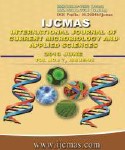


 National Academy of Agricultural Sciences (NAAS)
National Academy of Agricultural Sciences (NAAS)

|
PRINT ISSN : 2319-7692
Online ISSN : 2319-7706 Issues : 12 per year Publisher : Excellent Publishers Email : editorijcmas@gmail.com / submit@ijcmas.com Editor-in-chief: Dr.M.Prakash Index Copernicus ICV 2018: 95.39 NAAS RATING 2020: 5.38 |
Professional fisheries education is a new branch of science, which is having tremendous potential sooner rather than later. A new era in the professional fisheries education in India started at the State Agricultural/Veterinary Universities with the establishment of first Fisheries College at Mangalore in 1969. Presently, there are thirty professional fisheries colleges in India. Professional fisheries graduates have employment opportunities in fisheries departments of Central and State Governments, fisheries research institutes, academic/ universities and so on. Legitimate assessments of workforce necessities of the fisheries sector are yet to be made. There is scope for producing more professional fisheries graduates. The graduates seem to require a superior establishing in administration procedures and more practical experience in commercial operations. The capability of fisheries sector could be used and created through quality advanced education in fisheries. With appropriate planning for developing fisheries, higher education following the above-mentioned strategies the development of fisheries sector could be accomplished to a more prominent degree. The Fifth Deans’ Committee supporting the harmoniousness of perfection and significance has reasonably refreshed the agricultural and allied educational systems in India. The Report also prescribes minimum standards for setting up a new college and mostly professional fisheries colleges have implemented the ICAR Fifth Deans’ Committee recommendations. The projections indicate that by 2022 the annual outturn required from professional fisheries colleges/institutions ought to be around 2,820 B.F.Sc., 450 M.F.Sc. and 220 Ph.D. The present yearly intake capacity of B.F.Sc., M.F.Sc. furthermore, Ph.D. programmes are 1,079; 417 and 181 respectively, while the annual outturn might be around 85-95% of intake.
 |
 |
 |
 |
 |